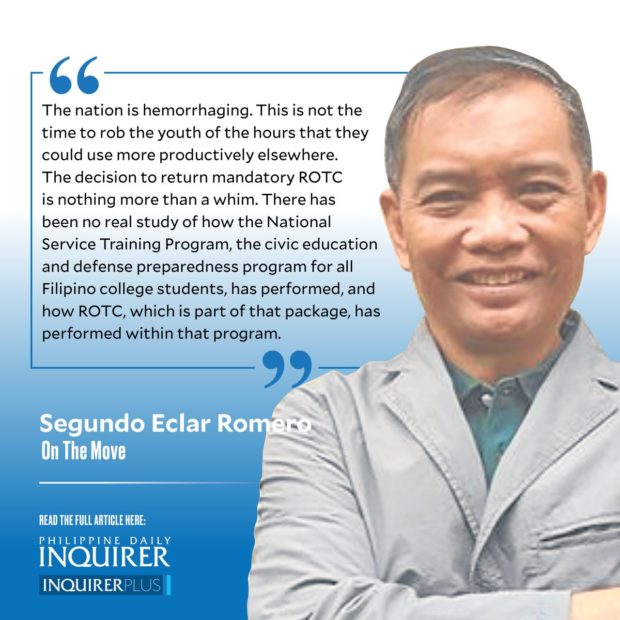Tesda, not ROTC, is the answer
 I look at the idea of “degrees of freedom” as akin to that apocryphal problem of how much rocks, stones, pebbles, sand, and water you can put into a glass jar. The rocks represent really valuable things like family and health, stones might be career choices, pebbles might be projects we engage in, sand might be routine activities like communicating and eating, and water might represent how we tweak and synergize all of these activities.
I look at the idea of “degrees of freedom” as akin to that apocryphal problem of how much rocks, stones, pebbles, sand, and water you can put into a glass jar. The rocks represent really valuable things like family and health, stones might be career choices, pebbles might be projects we engage in, sand might be routine activities like communicating and eating, and water might represent how we tweak and synergize all of these activities.
Now, the problem with the Marcos Jr. administration is that it has unduly been under pressure to decide which are the rocks, stones, pebbles, sand, and water in our lives as a nation. The pressure has come through his inaugural address and his first State of the Nation Address, where he has rather cavalierly tossed pebbles of questionable value into the governance jar, there to impede more thoughtful ways of meaningfully filling the jar for the Filipino nation.
The pressure is not that these policy events are frontloaded, but the unpreparedness of the administration for the obligations side of farseeing high public office.
A rule in judging significance in statistics as in the real world is this—a big difference will be significant, even if true of a small sample. A small difference may not be significant in a small sample, but if it is applied to a large number of cases or universally, it will be significant. The case of the Reserve Officers’ Training Corps (ROTC), as an illustration, is a no-brainer. Each student will be making a senseless investment. And it will apply to all senior high school students.
The nation is hemorrhaging. This is not the time to rob the youth of the hours that they could use more productively elsewhere. The decision to return mandatory ROTC is nothing more than a whim. There has been no real study of how the National Service Training Program, the civic education and defense preparedness program for all Filipino college students, has performed, and how ROTC, which is part of that package, has performed within that program.
The Armed Forces of the Philippines and the Department of National Defense do not have the resources and the capacity to make ROTC work, whether as an improvement of its old concept, or a transformation into a new concept of civic engagement for national defense, disaster risk reduction and management, and volunteer service to the community.
In the more than 50 years I have been a reservist as a former ROTC officer, I have not received a single letter or email from the military, and I have not been invited to any meeting or follow-on activity relating to my investment of two years of blood, sweat, and tears in ROTC.
If there is any government office that can transform the nation dramatically, engage the youth, contribute to local problem solving, and use knowledge into action, it is staring us in the face, waiting to give the people in their depressed, uninspired communities in the countryside a real chance to learn an income-generating skill and gain personal confidence.
It is not the military and the ROTC but the Technical Education and Skills Development Authority (Tesda) that can do it. Let every senior high school student obtain a certificate of their choice from Tesda and let them devote a one-year period of volunteer service in a problem-solving engagement with real local governments and communities.
Just look at the Tesda capability-building menu: 21st-century skills; agriculture; automotive and land transport; construction; electrical and electronics; entrepreneurship; gender and development; heating, ventilating, air conditioning and refrigeration technology; human health/health care; information and communication technology; lifelong learning skills; maritime; processed food and beverages; social, community development and others; tourism; and International Labour Organization (ILO) online courses.
Compare it with the ROTC menu. Basic ROTC focuses on providing its graduates with the fundamental skills of leading, shooting, moving, navigating, and communicating, all within the context of the military organization, not quite the same as the business and professional organizations one will have to deal with in real life. Sure, ROTC can be reinvented. But it starts from a very shallow and unimaginative base.
I cannot see how the top officials of the agriculture and education departments cannot tell the difference between a national livelihood mobilization through Tesda and a veiled national anti-activist mobilization through ROTC.
doyromero@gmail.com




















